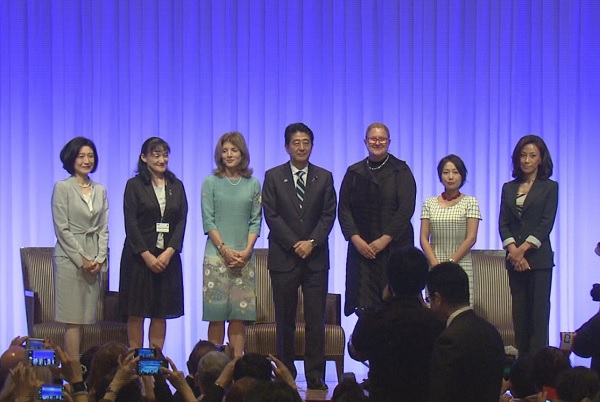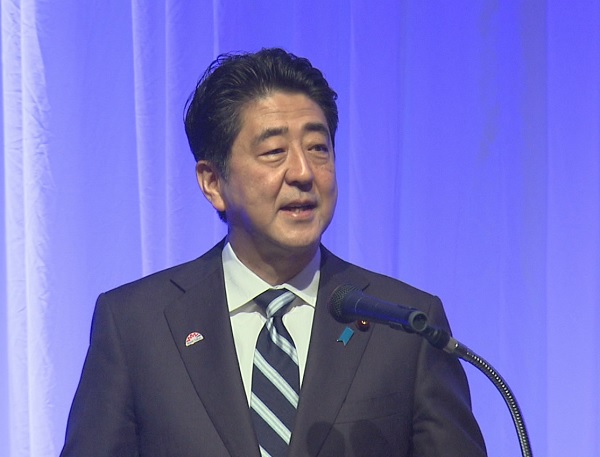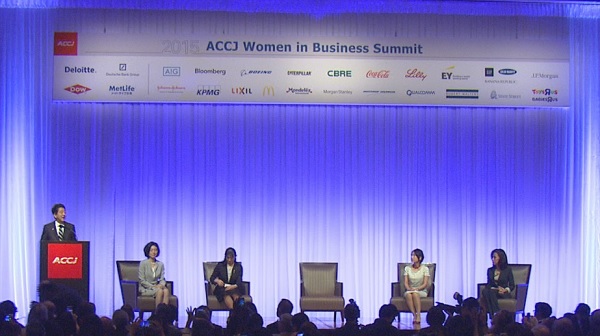Home > News > The Prime Minister in Action > June 2015 > ACCJ Women in Business Summit
The Prime Minister in Action
ACCJ Women in Business Summit
June 29, 2015
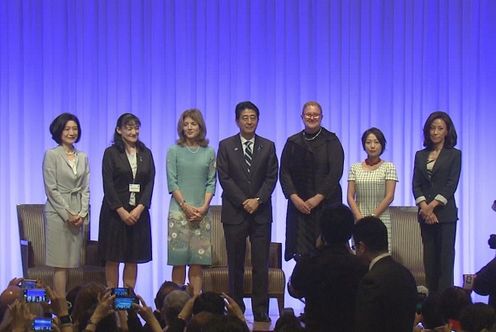
Photograph of the Prime Minister delivering an address (1)
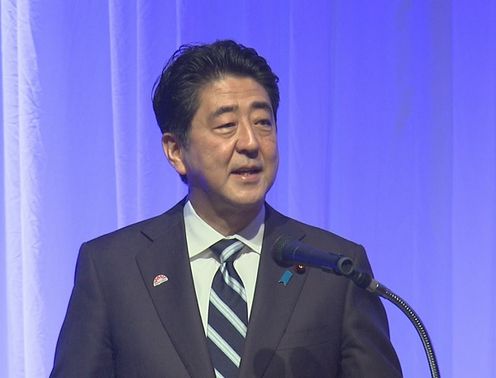
Photograph of the Prime Minister delivering an address (2)
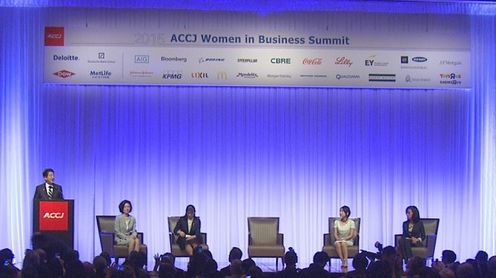
Photograph of the Prime Minister delivering an address (3)
[Provisional Translation]
Prime Minister Shinzo Abe attended the 2015 ACCJ Women in Business Summit held in Tokyo.
The Prime Minister said in his address,
“I would like to express my sincere gratitude to everyone in attendance, as well as to the ACCJ for inviting me today.
Ever since its founding in 1948, the ACCJ has been making a tremendous contribution to the strengthening of Japan-US economic relations. Since 2013, the ACCJ has been holding its ACCJ Women in Business Summit. I deeply respect the contribution the ACCJ has made to promoting active participation by women.
The Abe Cabinet has positioned active participation by women as central to our Growth Strategy.
However this is not just about active participation by women. At the UN General Assembly last year, I declared that Japan would actively lead the creation of a society in which all women shine on a global scale. Japan established and hosted ‘WAW! (World Assembly for Women),’ an event in which the women who are leading the world gathered in Japan. Two and a half years since the inauguration of the Abe administration, I sense that social trends are clearly changing.
I have said before that I would like to see the appointment of at least one female executive among the management team at every publically listed company. Since then, there has been steady progress in the appointment of female executives at each company, with over 800 female executives now active. I have heard that Ms. Matsumura, who is on stage today, entered her company as an ‘ippanshoku’ (clerical staff engaged in a support role), tackled one challenge after another, and was promoted to an executive position this April. I am overjoyed to hear that people like her who have contributed significantly to their company and society through years of hard work are now being appointed one after another to positions of great responsibility.
When I first began working at Kobe Steel a long time ago, I started out in sales. There was a lady working in administration who was clearly better at her job than I was, and who gave me a lot of guidance. However, at that time, there was absolutely no intention in the office to appoint her to a higher position as a result of her abilities. I believe that if the women I knew then were in one of today’s workplaces, they would surely be leading much different lives. Furthermore, their companies would also benefit greatly.
This does not just apply to individual companies. From the founding of the Keidanren in 1946 onward, all of its executives were male, until the appointment of Ms. Yoshida, who put an end to that history when she took the position of Vice Chair of the Board of Councillors.
I appeared at a Keidanren meeting last year and I made a slightly critical remark about the fact that although the senior figures at Keidanren were all talking about the advancement of women, there were almost no women at the venue. This year, at long last, Ms. Yoshida was appointed to her current position.
Tackling challenges in new fields and rising up to a new stage for the first time as a woman is something that takes courage, and actually it may incur many failures of various sizes. However, the truth is that there is much to be learned from failure. As someone who took up the challenge of being Prime Minister after stepping down once, I have no doubt about this. In this way, the number of women actively participating in new roles is steadily increasing. However, this is only just the beginning.
We need to expand every facet of this movement to help women shine and make sure it takes hold across society as a whole. In the current session of the Diet, a bill on promoting active participation by women is being discussed. As a result of everyone’s hard work, we have already seen the unanimous approval of the bill in the House of Representatives, and we are now aiming to enact the bill as soon as possible following discussion in the House of Councillors. Once the bill is enacted, all major corporations will be required to formulate a plan that includes numeric targets on matters such as the hiring of women, the development of their capabilities, and the furthering of their careers.
Serious discussion will begin at all major corporations across Japan toward promoting active participation by women. In order that the measures put forward by each company can be understood at a glance, the Government will organize them and ensure their full visibility. We will continue to implement measures to support the efforts of companies.
We will also create rules that will allow us to more broadly appraise companies working intensively to promote work-life balance and active participation by women, as part of the government procurement process.
Based on the needs of industry, such as the need to have more participation by women in the science and engineering fields, we are supporting efforts to foster women who aim to be ‘Rikejo’ (women who are actively involved in the sciences) starting from junior high and high school age. I hope that we will see the ever greater success of women with training in the science and engineering fields like Ms. Ogawa, who is on stage.
I believe that there are many women who would like to give their all for their marriage, raising their children, and their careers. That said, it deeply saddens me that we have not yet seen an end to maternity harassment, whereby women are unable to continue working due to becoming pregnant or giving birth, or are no longer able to participate in the workforce as they like. I have heard from people affected by this that it is difficult for them to speak up about it. Ms. Osakabe is one person who has courageously raised social awareness about the problem of maternity harassment.
To encourage participation by women and in order to put a stop to the declining birthrate as well, we must eliminate this kind of disadvantageous treatment. As a representative of the Government, I promise that we will first elucidate the current situation, and then advance measures to appraise the initiatives being undertaken by companies, including through the establishment of legal measures. Furthermore, the Government as a whole will support women working hard to overcome various challenges, including single-mothers who are raising children while also working.
The Abe administration will not let up on our efforts to support active participation by women. I would like to close my remarks by promising to raise the flag of support for women who shine even higher.”

